July 2018 2nd Edition
July 2018 2nd Edition Joy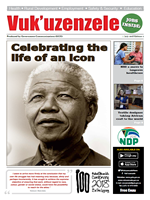
Translations
100 free medical operations to honour Mandela
100 free medical operations to honour Mandela JoyA Western Cape initiative to honour Mandela has been life-changing for a number of sick children.
Two-year-old Zahrane Lewin from Cape Town was born with enlarged tonsils, which affected her ability to keep food down and caused interrupted sleep for the little girl.
With her condition worsening, her parents were desperate to provide her with the operation she would need to have her tonsils removed and lead a normal life.
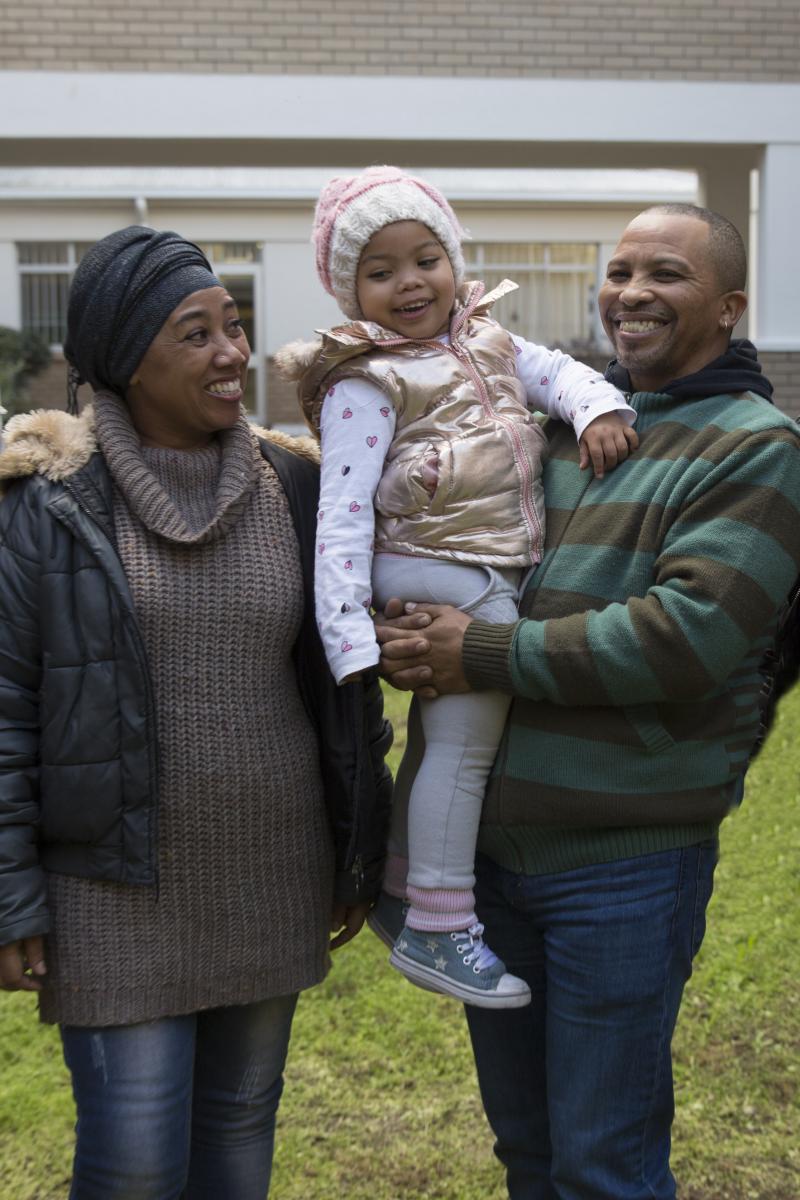 Doctors from the Red Cross War Memorial Children’s Hospital in the Western Cape placed Zahrane on a long waiting list and told her parents that they would probably only receive a call in one or two years’ time.
Doctors from the Red Cross War Memorial Children’s Hospital in the Western Cape placed Zahrane on a long waiting list and told her parents that they would probably only receive a call in one or two years’ time.
But thanks to an initiative from the Western Cape Department of Health, Zahrane was in the operating theatre just a few days later, receiving an operation that would change her and her family’s life.
Looking for a way to honour the year of President Nelson Mandela’s Centenary the department – with financial support from Sea Harvest – committed to performing 100 free operations at the Red Cross War Memorial Children’s Hospital in Cape Town.
Sea Harvest donated R300 000 towards the initiative, which targets waiting list patients with throat, nose, ear, hip and knee problems.
Zahrane was one of the first recipients of the campaign.
“I received a call and was told that Zahrane could receive the operation almost immediately. At first, I thought it was a prank, but when I arrived at the hospital I could see that it wasn’t. It really was a miracle,” Yolande, Zahrane’s mother said.
The operation was carried out successfully, and Yolande says that she believes the surgery has saved her little girl’s life.
“The change in Zahrane has been truly amazing. She is keeping food down and getting the nutrients she needs. Previously, she would wake up throughout the night crying for milk. Now, she sleeps through the night.”
“We are pleased with the way the initiative has progressed. Medical staff have been working overtime to reduce the backlog of surgical waiting lists and ultimately improve and prolong patients’ quality of life,” said the provincial Department of Health’s spokesperson Aneeqah Kamish.
This year’s initiative follows the 67 free cataract surgeries performed by the department for Mandela Month last year.
Cars to speed up gender-based violence relief
Cars to speed up gender-based violence relief vuyelwanOrganisations that give support to the victims of gender-based violence will now be able to respond more effectively, thanks to the donation of vehicles by the Gauteng government.
The Gauteng Department of Social Development recently handed over 12 vehicles to non-profit organisations (NPOs) that help fight gender-based violence.
The NPOs render victim empowerment services and the vehicles are meant to make it easier for staff members to get around, especially when helping victims of abuse. 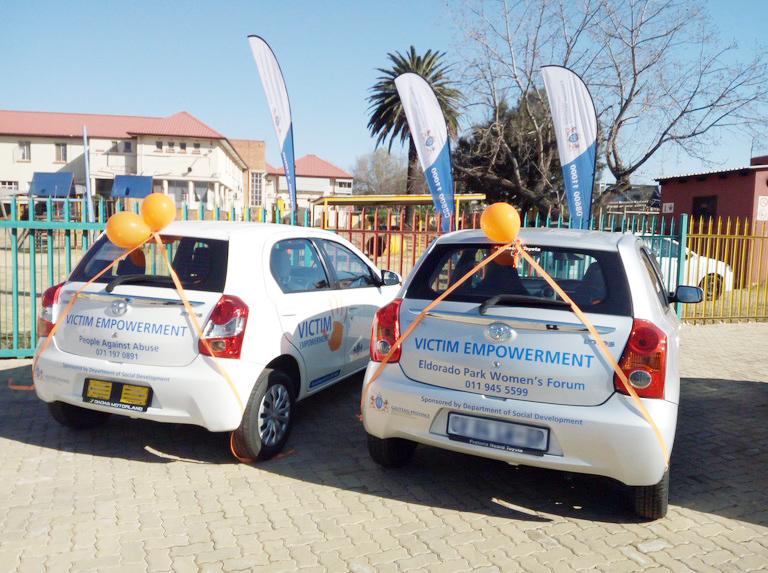
Speaking at the handover ceremony at Igugulethu Child and Youth Care Centre in Boksburg, Social Development MEC Nandi Mayathula-Khoza said the cars will help provide more immediate 24-hour support to communities, to make sure that critical interventions are not missed.
“We handed over these cars mainly because during our visits to shelters, we saw there was a serious challenge regarding transportation and this is one of our ways of addressing it.
“This shows our commitment to these NPOs; it must be noted that we value the work done by these organisations in assisting government to achieve its mandate, and by so doing we will continue to provide integrated social welfare services for the care, support and protection of victims of gender-based violence and crime,” said Mayathula-Khoza, who added that 11 349 victims have sought help from the 65 organisations that are funded to deliver victim empowerment services.
Oupa Pila from Carrollshow shelter, which is an NPO that helps abused men, said the vehicle they received is highly appreciated and will go a long way in assisting them in achieving their mandate.
“For some time we have been operating without transport and we are based in a semi-rural area so one can only imagine how difficult it has been for us to get around.
“From time to time we have to take men for medical care to clinics or to courts, and using taxis further victimises them. This car will honestly make our work a lot easier,” said Pila, who intends on intensifying their programme of visiting schools around the region to engage with young boys about bullying and gender violence.
Celebrating the life of an icon
Celebrating the life of an icon Joy“I seem to arrive more firmly at the conclusion that my own life struggle has had meaning only because, dimly and perhaps incoherently, it has sought to achieve the supreme objective of ensuring that each, without regard to race, colour, gender or social status, could have the possibility to reach for the skies.”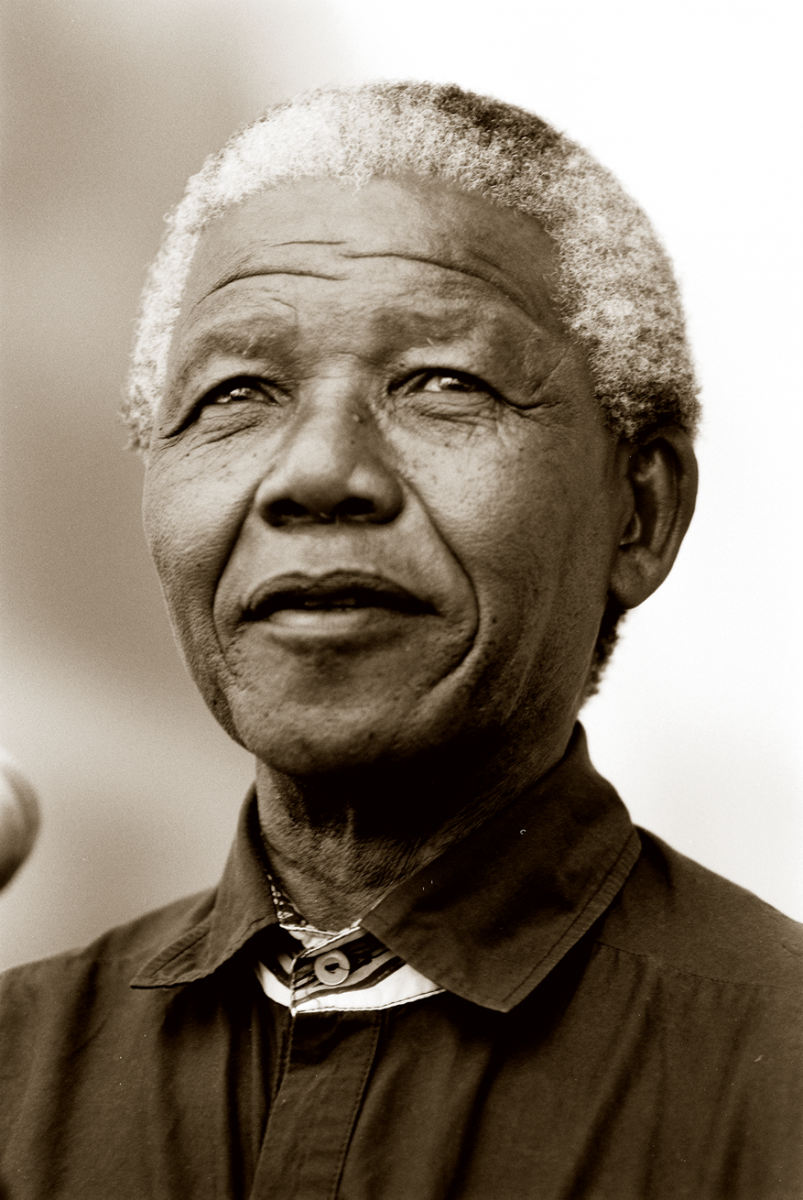
Computer lab gives student nurses the cutting edge
Computer lab gives student nurses the cutting edge vuyelwanTechnological teaching methodologies will be used in the training of nurses in KwaZulu-Natal (KZN).
A multi-media centre worth R1.2 million has been donated to the nursing school at Grey’s Hospital in Pietermaritzburg, KZN to improve skills training for student nurses.
One of the students at the nursing school Busisiwe Sithole said the computers will help her and fellow students to better understand the content that they study because technology will allow them to practically see the imagery and videos of what they studied in theory.
“The computers will also assist us in our future careers because nowadays everything that we use is digitised and of high technology. We are lucky to have these computers because by the time we finish our studies we will be skilled to use technology wherever we will be working,” she said. 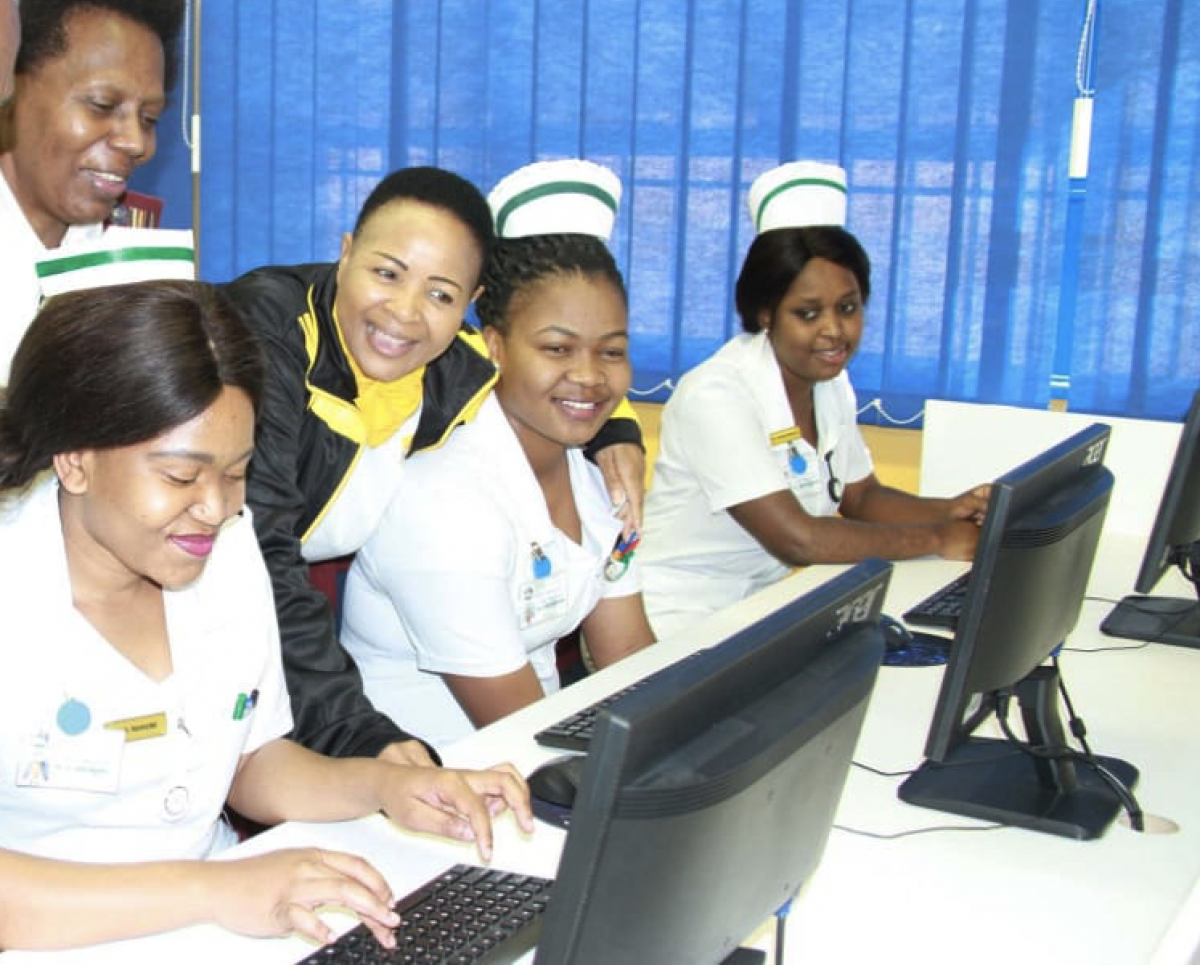
“Members of the public will also benefit from this because when we use technology in our health facilities, we are able to speed up the delivery of services. For instance, we can use the computer to find patients’ records or retrieve their files, unlike having to manually look for the files which could take some time and cause delays,” she added.
Provincial Health MEC Sibongiseni Dhlomo said the donation will result in improved public healthcare service delivery through the production of suitably equipped and skilled nurses.
The donation by MTN includes a high-tech computer laboratory with 41 computers, free data, and specialised anatomy and physiology online learning software for more than 400 nursing students.
The laboratory also consists of two interactive whiteboards, two laptops and two printers. Lecturers have also been trained in its use. According to MTN SA, this is the ninth donation of this nature in the country.
The cellphone network company said the initiative leads to a massive academic improvement, with nursing students averaging a 90 percent pass mark in challenging subjects such as physiology and anatomy.
MTN SA Foundation senior manager Angie Maloka said the cell phone network is happy to hand over the multi-media centre to the nursing school because images are an important part of nursing content.
“We have provided content that is interactive. When a student speaks about the lungs for example, they will be able to see the lungs in a 3-D scan or 3-D image and be able to internalise it,” she said.
Cuba trained medical students happy to be home
Cuba trained medical students happy to be home JoyZazi Zulu is one of the 260 fifth-year medical students who are pleased to be back home after having left South Africa to study medicine in Cuba six years ago.
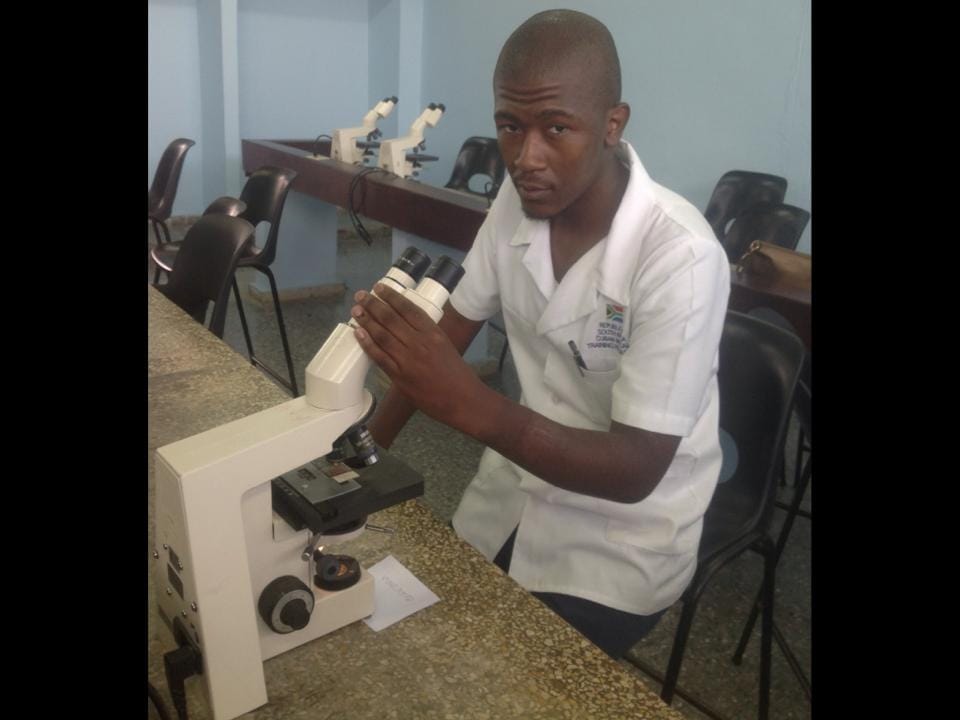 He left his home in Umgungundlovu District of KwaZulu-Natal in 2012 as a starry-eyed 17 year-old matriculant to pursue his dream of studying medicine.
He left his home in Umgungundlovu District of KwaZulu-Natal in 2012 as a starry-eyed 17 year-old matriculant to pursue his dream of studying medicine.
Zulu was one of the bursary recipients who were awarded an opportunity to study abroad as part of the Nelson Mandela Fidel Castro (NMFC) medical collaboration programme of the Department of Health.
Through the programme, the department awards qualifying and deserving students an opportunity to study medicine in Cuba free of charge.
The NMFC programme was established by presidents Nelson Mandela and Fidel Castro in 1996 as part of the various bilateral agreements between South Africa and Cuba.
The programme was established to address the over-concentration of health personnel in urban areas and in the exclusionary private sector; insufficient personnel who were also not in possession of the necessary training and the under-provision of health care in rural and peri-urban areas, as well as informal settlements.
Health Minister Aaron Motsoaledi welcomed the students back into the country on Saturday.
The returning students were part of the 2 885 South African medical students in Cuba at various levels of study.
No fewer than 590 doctors have already qualified from the training programme since it started in 1996, while 98 students are doing their final year at South African medical schools.
Minister Motsoaledi was accompanied by his Deputy Joe Phaahla together with families and loved ones to welcome the fifth-year medical students at a ceremony held at OR Tambo International Airport.
The students will complete their sixth-year studies and integration into the South African health system. They will spend the next 18 months of studies at various South African universities, and then be dispatched to their districts of origin to start working as Doctors.
Upon arrival, Zulu said he was happy to be reunited with his family of ten members. Each one of them wore a specially-designed black T-shirt written ‘Dr Zazi Zulu’ and they carried a big banner with the message: “Welcome Back, Mageba.”
“I am very pleased with the warm reception that we have received upon our return. I am looking forward to applying all the knowledge that I have gained in Cuba. I want to use my skills and expertise and work with diligence for the benefit of my fellow compatriots,” he said.
“My success up to this point has not been due to my wisdom, but rather the Grace of God,” he said.
He also expressed gratitude to the government of South Africa.
“If it was not for the NMFC programme, we would never have been able to study medicine… many of us are from poor backgrounds. We are grateful, and hope that government will be able to help uplift others as well.”
Don’t forget to Travel Smart
Don’t forget to Travel Smart UrsulaInternational Relations / Africa News
The Travel Smart campaign will go a long way towards improving the general understanding of Consular Services.
Planning your next trip abroad? Then you might want to know more about the laws of the country you are visiting as well as other necessary information just in case of an emergency.
This is because falling sick, becoming a victim of crime or facing an emergency can be traumatic especially when you are in a foreign country.
The “Travel Smart” campaign by the Department of International Relations and Cooperations (DIRCO) Consular Service will be your guide in this regard.
“Travel Smart” is aimed at encouraging South Africans to research their destinations and the laws of the countries they seek to visit or apply to work in.
“Most South Africans face the reality of being destitute in foreign countries and under these circumstances they seek our assistance without prior knowledge of what services we are mandated to provide. This situation must be changed and I believe that the Consular Service campaign we are launching will enable us to do so,” said DIRCO Deputy Minister Reginah Mhaule when she was unveiling the campaign.
Fifty-one young South Africans
Another group which can tell better the realities of being stuck in a foreign country is the 51 young South Africans who were enticed by an agent to travel to China on a study visa while planning to work as English teachers.
The promise was that they would get their work visas upon arrival in China, which never materialised.
While in China on study visas, they started working, which was in contravention of the immigration laws of China.
Liaising with Chinese authorities Dirco helped the stranded citizens, who were victims of a visa scam.
About 49 of the 51 have returned home safely and the remaining two will remain in custody as they served as recruiters.
www.SAnews.gov.za
Learn more about your destination
Before boarding an aeroplane South Africans are advised to take time to learn about the financial, political, cultural and economic environment of their intended destination, as well as a few key phrases in the host country's language.
It is advisable to also have the contact details of the nearest South African representative office and to carry contact details of their next of kin at all times.
Those planning to travel can familiarise themselves with the information that is readily available on the Dirco website
www.dirco.gov.za
ECD centres essential for the growth of children
ECD centres essential for the growth of children lebangSouth Africa has more than eight million children under the age of six. Children in this age group are at a crucial stage in their development and the care they receive at this point will help them to become healthy, happy and productive members of society.
 The provision of Early Childhood Development (ECD) programmes in South Africa is then vital to their growth and the future of the country.
The provision of Early Childhood Development (ECD) programmes in South Africa is then vital to their growth and the future of the country.
The National Development Agency’s (NDA) ECD Specialist Thando Ngqase said children needed to be stimulated from a young age for them to reach their potential.
“Ninety percent of brain development occurs before the age of five. Ten percent of brain development occurs beyond the age of five years. ECD centres or ECD programmes are essential in ensuring that children develop holistically – physically, emotionally and psychologically,” she said.
The NDA, an agency of government under the Department of Social Development (DSD), offers assistance, training and funding to those who want to open and register ECD centres in their communities.
There are currently 26 645 registered ECD centres in the country, with 827 338 children accessing ECD services. Of these, more than 500 000 have been subsided by government to attend these facilities. KwaZulu-Natal, Eastern Cape and Limpopo have the highest number of children in South Africa, said Ngqase.
Many factors had to be taken into consideration before anyone could open an ECD facility, Ngqase advised.
A potential ECD practitioner needs to have a qualification in the field, or have previously worked with young children.
“The Children’s Act 38 of 2005 states that a person who wants to run an ECD programme has to have at least three years’ experience in ECD, or an ECD National Qualifications Framework (NQF) qualification on levels 1, 4, 5 or 6,” she said.
 The practitioner must also be able to teach children according to the ECD educational standards upheld by the Department of Basic Education.
The practitioner must also be able to teach children according to the ECD educational standards upheld by the Department of Basic Education.
“The National Curriculum Framework guides the development, implementation, continuous assessment and evaluation of the programmes run in ECD centres,” said Ngqase.
Good nutrition also forms part of a child’s development, and many ECD centres provide a daily meal. Ngqase said that the Department of Health had penned Guidelines on Nutrition in ECD to help practitioners understand what to feed children, draw up seasonal menus and recipes, and prepare and buy certain quantities of food per child.
Ngqase said ECD centres could access funding from the Department of Social Development in the form of subsidies, with the average subsidy per child being R15 a day. However, it was difficult to say how much money a potential ECD practitioner would need to set up a facility.
She said the costs related to setting up an ECD depends on the type of structure where the centre will be set up.
For more information on registering an ECD centre contact:
- The National Development Agency on 011 018 5500
- Any provincial or regional office of the Department of Social Development
- Visit the Department of Social Development website: http://www.dsd.gov.za
Farmers combat climate change
Farmers combat climate change JoyClimate-resilient livestock and crops are being provided to farmers in vulnerable communities in response to changing weather patterns.
The Namakwa District in the Northern Cape is a dry, hot and remote place where farming activities are heavily affected by climate change.
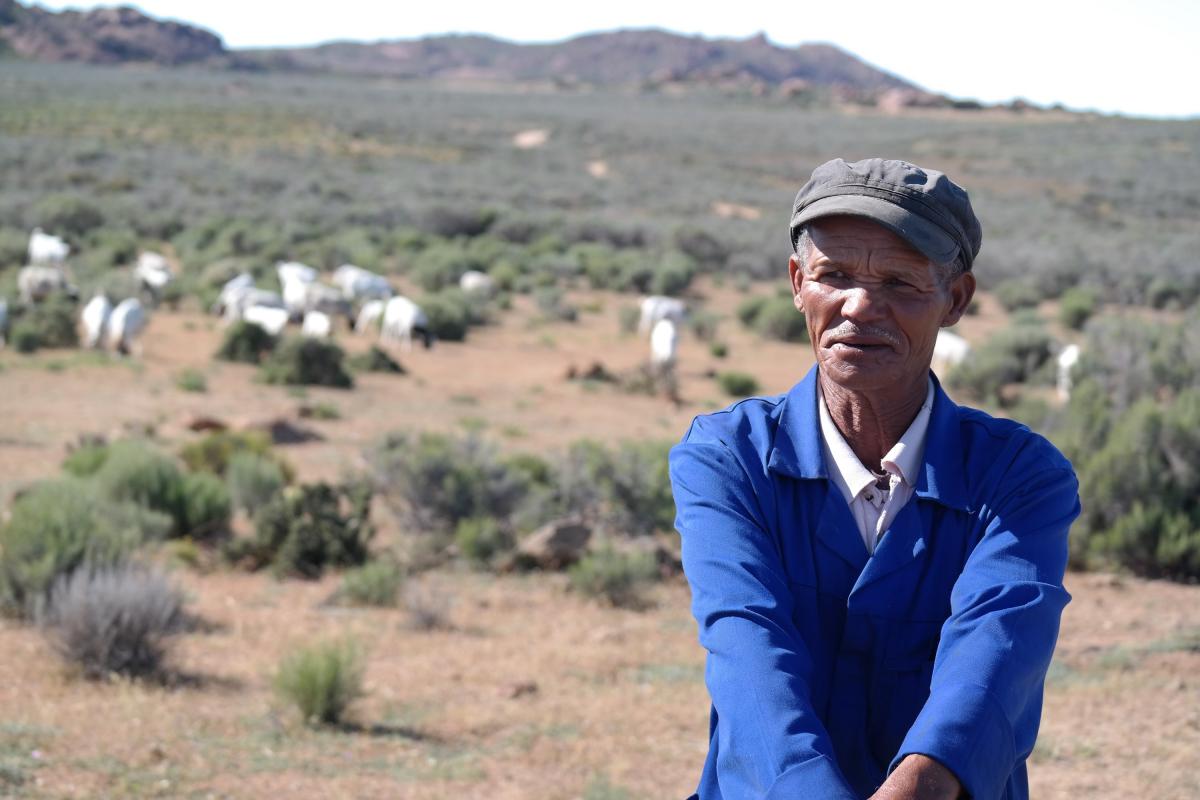 Here, livestock farmers struggles to cope with the extreme heat and cold, meaning that many battle to make a living. But thanks to a ground-breaking project implemented by the South African National Biodiversity Institute (SANBI) and supported by the Department of Environmental Affairs, these farmers are starting to win the battle against climate change.
Here, livestock farmers struggles to cope with the extreme heat and cold, meaning that many battle to make a living. But thanks to a ground-breaking project implemented by the South African National Biodiversity Institute (SANBI) and supported by the Department of Environmental Affairs, these farmers are starting to win the battle against climate change.
The Adaptation Fund is a global initiative which finances projects and programmes in vulnerable communities, with a special focus on projects that deal with the effects of climate change. SANBI was selected as the implementing agent of this programme in South Africa. Under the programme, a R33 million Small Grants Facility has been set up to empower rural farmers and communities to fight drier conditions.
In the Namakwa District, one of the grantees is the Biodiversity and Red Meat Co-operative (BRC). In 2016, it received a grant to introduce new indigenous breeds of livestock in the rural community of Leliefontein. This was after long periods of drought had weakened local livestock production and sales. In 2015, for example, 80 percent of all lambs and 10 percent of productive ewes were killed during a cold spell in the region.
The co-operative identified that indigenous breeds would be much more resilient to the extreme climate of the area. A total of 65 sheep and goats were distributed amongst the BRC farmers. Since then, the original stock has produced 350 healthy offspring, which has increased production and income for the farmers and proven that the project is meeting its aims.
For Katie Beukes, the project gave her the opportunity to start farming.
“I am a member of the BRC, but previously I only owned land and not livestock. Now, the co-operative has offered me livestock to start farming. I plan to keep breeding my livestock and improve my livelihood by selling to local markets,” said Beukes.
SANBI’s strategic grants manager Michael Jennings said farmers and community members were offered the chance to apply for funding, based on projects that would allow them to build resistance against climate change.
“Once a project is approved and they receive funding, the communities are able to adapt their projects to their own needs, and then manage those projects themselves. We support them with capacity building and funding.”
Fashion entrepreneur with pride
Fashion entrepreneur with pride tsoanaWhat started out as a T-shirt printing hobby for Guguleth u-born Thabiso Mokomele has grown into an award-winning clothing business.
u-born Thabiso Mokomele has grown into an award-winning clothing business.
Mokomele won first prize in the City of Cape Town’s #YouthStartCT entrepreneurial challenge – which came with a R10 000 cash prize, a laptop and business support.
Established in 2008, T-squared Clothing produces hand-made urban wear, including T-shirts, hoodies, beanies, caps and track pants.
#YouthStartCT is about providing a platform for the abundance of creative business ideas to help young people learn how to grow their businesses and become employers.
Mokomele said the award did not come easy, and that hard work and sweat over the years coupled with passion got his business to where it is today.
“I think every entrepreneur in business goes through that phase when you feel you want to quit but I think it really boils down to passion. You have to be passionate about what you are doing.”
The competition organisers said Mokomele’s clothing carries slogans that encourage people to push past the limitations of poverty, adding that the sign above the door of his garage in Gugulethu, where he hand-crafts the garments, says it all: ‘There is no success without hardship.
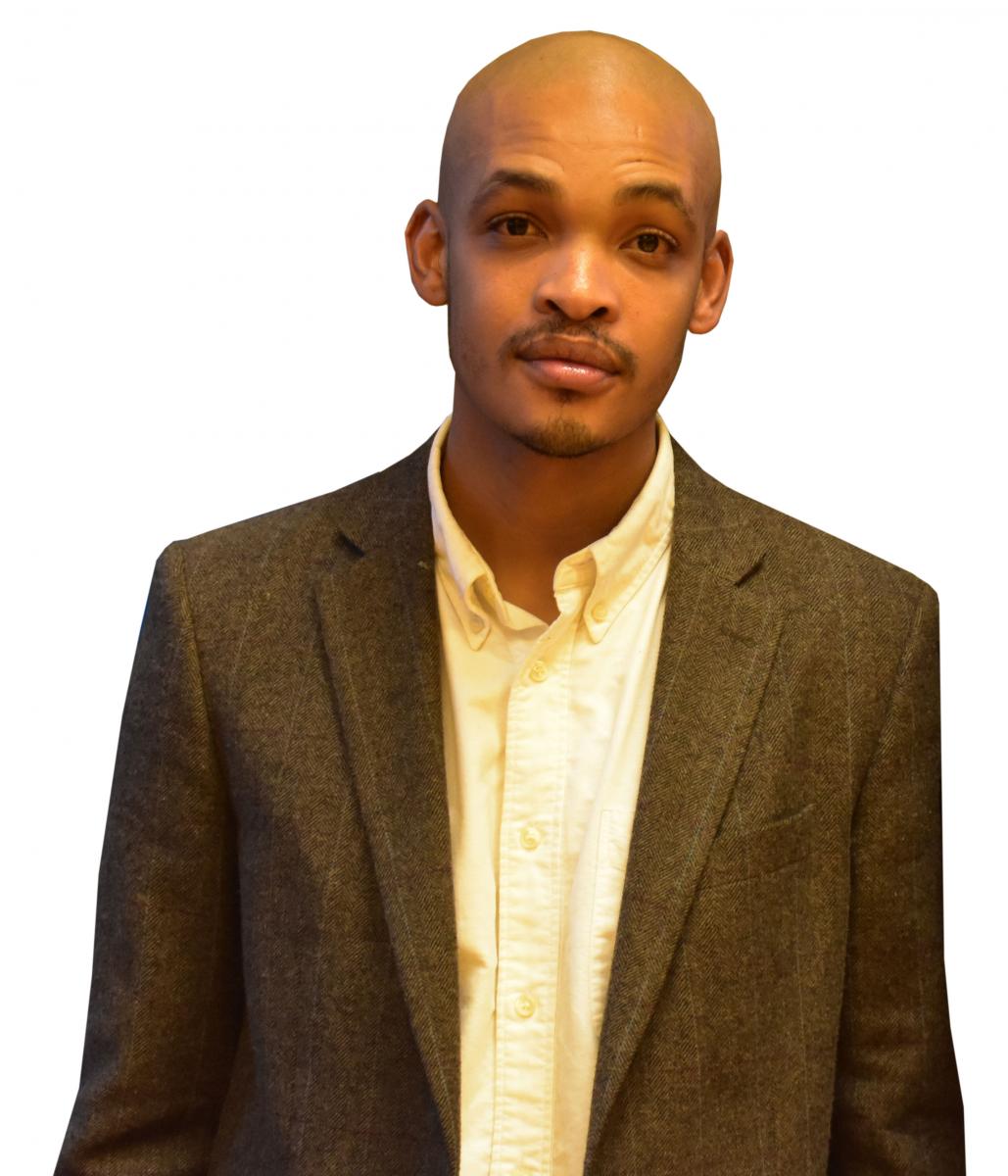 Mokomele’s journey has been interesting. While he was at Rhodes High School in Mowbray, he printed T-shirts and sold them to his friends as a hobby and to help finance his education. In 2010, he registered for a B Admin Degree majoring in Human Resources Management. He continued his T-shirt printing business while studying and in his final year, he purchased his first sewing machine.
Mokomele’s journey has been interesting. While he was at Rhodes High School in Mowbray, he printed T-shirts and sold them to his friends as a hobby and to help finance his education. In 2010, he registered for a B Admin Degree majoring in Human Resources Management. He continued his T-shirt printing business while studying and in his final year, he purchased his first sewing machine.
He finished his Honours Degree in 2014 and in 2015, he joined Woolworths for a year as an HR graduate. His business was doing well, however, and he chose to turn down the opportunity to extend his contract with the franchise.
In 2017, he opened a second store in Joburg and employed another two people, in addition to his three Cape Town employees.
Last year, Mokomele won the 2017 KFM and Lead SA Young Entrepreneur of the Year Award.
Fezeka Secondary reigns at School Choir Championships
Fezeka Secondary reigns at School Choir Championships UrsulaSport, Arts and Culture
Affording school learners an opportunity to participate in school choir competitions does not only help to harness their musical talents but also teaches them to be sociable, disciplined, humble and focused in everything they do in life.
This is according to Monde Mdingi who is a Conductor for Fezeka Secondary School choir in Gugulethu in the Western Cape.
Mdingi spoke to Vuk’uzenzele after his choir won three categories at the 2018 ABC Motsepe School Choir Eisteddfod National Championships hosted by the Department of Basic Education and the Motsepe Foundation in Johannesburg recently.
His choir came first position in the mixed choirs category and small ensemble category. It also came second position in the National Anthem category.
“It took team work for our school to win this year. We did not only win because of the efforts made by our choir but because of the support we always get from teachers and the Principal to prepare the learners psychologically for the competitions,” he said.
“I also did a lot of research to ensure that we get everything right ahead of the competition and encouraged the choir to work as hard as they can,” said Mdingi.
Meanwhile, South Africa was excited to be the first in Africa to host the largest international choir competition in the world during the 10th World Choir Games 2018.
More than 16 000 participants from over 60 countries travelled to Tshwane for the highly anticipated choral music extravaganza, which ended on 14 July.
Flo saves her dough to become a pizza queen
Flo saves her dough to become a pizza queen vuyelwanShe may be a rebel but the Pretoria go-getter has pizza lovers lining up for more.
Florence Ndlovu is proof that hard work really does pay off. Over the years, she has managed to save up enough money to make her dreams come true. 
Popularly known as Flo, the 35-year-old from Pretoria owns a Rebels Pizza outlet in Tshwane and is set to take an even bigger slice of the market.
Speaking to Vuk’uzenzele, Ndlovu said she has always wanted to own a pizza franchise. “It sure was a struggle because I initially didn’t have the funds but I never let go of my dreams. Instead, I worked for different companies over the years, gaining experience and saving money. I also refrained from cashing out my pension fund when I changed jobs.”
Eventually, Ndlovu had saved up R100 000. She resigned from her job, put down a deposit on a Rebels Pizza outlet in Middestad Mall and negotiated a payment plan. Four months ago, her sacrifice and dedication paid off when her first pizza was served to her first customer.
Although new-kid-on-the-block Rebels Pizza is relatively unknown, Ndlovu’s store attracts over 500 customers a week. Her business currently employs 13 young people from Pretoria and surrounding areas and she intends recruiting more as the business continues to grow.
“I cannot stress how important it is to never give up on your dreams. At no point did I ever think that my business would grow so big in such a short space of time and I’m thankful to all those who’ve supported it and continue to do so.
“It is because of this that I get to really see that ‘motho ke Motho ka batho (a person is a person because of other people),” said Florence, who added that her plans are to ultimately run a chain of Rebels Pizza stores and contribute meaningfully to society.
Freeing teens from the grip of addiction
Freeing teens from the grip of addiction JoySubstance abuse among youth has a severe effect on communities and families along with addicts getting younger every year.
 Substance abuse is one of the biggest challenges facing the youth of South Africa.
Substance abuse is one of the biggest challenges facing the youth of South Africa.
In an effort to save affected teenagers from alcoholism and drug dependence, City of Johannesburg Mayor Herman Mashaba and MMC for Health and Social Development Ntombi Khumalo recently launched the refurbished Golden Harvest In-Patient Treatment Centre.
Based in Randburg in Gauteng, it aims to address alcoholism and drug dependence through the provision of free specialised development, prevention and treatment programmes.
It works in partnership with the City of Joburg and the Gauteng Provincial Government through the Department of Social Development.
The centre was initially opened in 2011 and could accommodate 12 teenage boys between the ages of 13 and 17. In 2014, the city undertook to expand the centre to cater for more children.
The director of the centre, Terrence Makananisa, said the plan was to also extend services to children from as young as 10 because it was found that the younger age group is also affected by drug abuse in the province.
“The construction of the refurbished centre was completed in 2016 and it now has the capacity to accommodate 58 male and female teenagers,” said Makananisa.
Makananisa said the centre admits patients through a referral process from social workers and out-patient facilities in Gauteng. However, he said it does not reject referrals from other provinces.
Out-patient centres and social workers who would like to refer their patients to the centre can
call 011 791 5944 / 011 836 2460 or visit
www.sancacentral.co.za
How to register an ECD centre
How to register an ECD centre lebangECD Specialist at the National Development Agency (NDA) Thando Ngqase explained the following steps needed to be taken to register an ECD centre:
Step 1: Register the ECD as a Non-Profit Organisation (NPO)
Registering an ECD centre as an NPO involves setting up a committee, and completing an NPO application form obtained from the DSD offices or website (http://www.dsd.gov.za/npo/). The applicant must write a constitution for the NPO, an example of which can be downloaded from the national DSD website. Once the form and constitution are completed, the applicant must submit these to the DSD. The applicant will then receive an NPO certificate in six weeks.
Step 2: Assessment of the ECD centre and facilities
The applicant must then approach the environmental office at their municipality for the assessment of their property or building from which he or she will run ECD programmes. The environmental health official is tasked with assessing the ECD centre to determine whether it meets the infrastructure norms and standards in housing children in safe environments. A facility should provide 1.5 square metres per child according to these standards.
Once the environmental health official has completed the assessment, he/she will then issue a health certificate. This certificate will indicate that the ECD centre can also house a specific number of children.
Step 3: Apply for Partial Care Registration
The applicant can apply for Partial Care Registration at the regional DSD office once he/she has an NPO certificate, constitution, business plan (DSD provides template for this) health certificate, copy of the plan of the building and proof that prospective staff members have been checked against the register of sexual offenders. The applicant will be assigned a social worker who will check the validity of the centre. The applicant must also register any programmes that he/she will be running from the ECD centre. The Partial Care Registration will then be issued.
The DSD has provisions for Conditional Registration for centres that do not meet all the required norms and standards. The centre is given 24 months to improve its standards while it is supported or subsidised to reach full registration status.
Jobs - Justice and Constitutional Development - July 2018
Jobs - Justice and Constitutional Development - July 2018 UrsulaDirector: Asset Management
(Re-Advertisement: Previous applicants need to re-apply)
(12 Months contract appointment)
Reference: 18/60/Cfo
Package: R948 174 – R1 116 918 per annum. The successful candidate will be required to sign a performance agreement.
Requirements: A Degree in Financial Management, Asset Management field (NQF level 7) or equivalent as recognized by SAQA; 6 years’ experience in Asset Management environment of which 5 years should be at middle/senior management level; Knowledge of Public Finance Management Act, Treasury Regulations and other relevant prescripts; Knowledge of Supply Chain Management within the Public Sector.
Enquiries: Ms. S. Bezuidenhout Tel: (012) 315 1090
Closing date: 27 July 2018
Note: Interested applicants may visit the following website: www.justice.gov.za or www.dpsa.gov.za to view the full job specification of the above positions. Applications must be submitted on Form Z83, obtainable from any Public Service Department or on the internet at www.gov.za. A Z83 form & CV must be accompanied by original certified copies of qualifications, identity document and a driver’s licence where necessary. A SAQA evaluation report must accompany foreign qualifications.
Applications that do not comply with the above mentioned requirements will not be considered. All shortlisted candidates for SMS posts will be subjected to a technical and competency assessment. Candidate will complete a financial disclosure form and also be required to undergo a security clearance. The foreigners or dual citizenship holder must provide the Police Clearance certificate from country of origin.
The DOJ&CD is an equal opportunity employer. In the filling of vacant posts the objectives of section 195 (1) (i) of the Constitution of South Africa, 1996 (Act No: 108 of 1996), the Employment Equity imperatives as defined by the Employment Equity Act, 1998 (Act No: 55 of 1998) and relevant Human Resources policies of the Department will be taken into consideration.
Reasonable accommodation shall be applied for People with Disabilities including where drivers licence is a requirement. Correspondence will be limited to short-listed candidates only. If you do not hear from us within 3 months of this advertisement, please accept that your application has been unsuccessful. The department reserves the right not to fill these positions. Women and people with disabilities are encouraged to apply and preference will be given to the EE Target.
Tel: 012 315 1111 Private Bag X81, Pretoria, 0001 Momentum Centre, 329 Pretorius Street, Pretoria www.justice.gov.za
Jobs - Labour July 2018
Jobs - Labour July 2018 UrsulaDeputy Director: ICT DOL/ UIF (2 posts)
Chief Directorate: Information Communication Technology
Reference No: HR4/18/7/8HO
Salary: All Inclusive: R 697 011 per annum
Enquiries: Mr. F Chabalala, Tel: (012) 309 4876
Head office
Chief Director: Human Resources Management:
Private Bag X 117, Pretoria, 0001
Assistant Director: Organisational Development
Directorate: Management Advisory Services, Head Office
Reference No: HR 4/18/07/13HO
Salary: Commencing: R 356 289 per annum
Enquiries: Mr. S Nkhabelane, Tel: (012) 309 4436
Head office
Chief Director: Human Resources Management:
Private Bag X 117, Pretoria, 0001
System Test Analyst
Chief Directorate: Information Communication Technology
Ref No: HR 4/18/07/06HO
Salary: Commencing: R 365 289 per annum
Enquiries: Mr. E Nowosiad, Tel: (012) 309 4990
Head office
Chief Director: Human Resources Management:
Private Bag X 117, Pretoria, 0001
Assistant Director: COID-Statutory Services
Provincial Office: Free State
Reference No: HR 4/4/8/193
Salary: Commencing: R 365 289 per annum
Enquiries: Mrs. A Mantutle, Tel: (051) 051 505 6347
Provincial office
Chief Director: Provincial Operations:
P O Box 522, Bloemfontein, 9300
Specialist: OHS
Provincial Office: Emalahleni
Ref No: HR 4/4/7/57
Salary: All inclusive: R 826 053 per annum
Enquiries: Ms NL Njwambe Tel: (013) 655 8775
Provincial office
The Department of Labour:
Private Bag X 7263, Emalahleni, 1035
ERRATUM
Withdrawal of posts
Kindly note that the following posts advertised on Vukuzenzele dated 1 July 2018 with a closing date of 16 July 2018 have been withdrawn.
Deputy Director: Human Resource Management:
Reference No: HR 5/18/05/21
Assistant Director: Career Counsellor-
Reference No: HR 4/4/7/39
Enquiries: Ms. BP Thwala, Tel: (012) 843 7300
Ms. L Mashego, Tel: (017) 819 7632
Closing date for applications: 30 July 2018 | For full details of the advertised posts visit our website: www.labour.gov.za
Applications must be submitted on form Z83, obtainable from any Public Service Department or on the internet at www.gov.za/documents. The fully completed and signed form Z83 should be accompanied by a recently updated, comprehensive CV as well as recently certified copies of all qualification(s) including a Senior Certificate and ID-document [Driver’s license where applicable]. Non-RSA Citizens/Permanent Resident Permit Holders must attach a copy of their Permanent Residence Permits to their applications. Should you be in possession of a foreign qualification, it must be accompanied by an evaluation certificate from the South African Qualification Authority (SAQA). Applicants who do not comply with the above-mentioned requirements, as well as applications received late, will not be considered. The Department does not accept applications via fax or email. Failure to submit all the requested documents will result in the application not being considered. Correspondence will be limited to short-listed candidates only. If you have not been contacted within eight (8) weeks after the closing date of this advertisement, please accept that your application was unsuccessful. Suitable candidates will be subjected to a personnel suitability check (criminal record, citizenship, credit record checks, qualification verification and employment verification). Where applicable, candidates will be subjected to a skills/knowledge test. All shortlisted candidates for SMS posts will be subjected to a technical competency exercise that intends to test relevant technical elements of the job, the logistics of which be communicated by the Department. Following the interview and technical exercise, the selection panel will recommend candidates to attend generic managerial competencies using the mandated DPSA SMS competency assessment tools. Successful candidates will be appointed on a probation period of 12 months. The Department reserves the right not to make any appointment(s) to the above post. The successful candidate will be expected to sign a performance agreement. The Department of Labour is an equal opportunity affirmative action employer. The employment decision shall be informed by the Employment Equity Plan of the Department. It is the Department’s intention to promote equity (race, gender and disability) through the filling of this post(s) with a candidate whose transfer / promotion / appointment will promote representativity in line with the numerical targets as contained in our Employment Equity Plan.
Jobs: Department of Environmental Affairs
Jobs: Department of Environmental Affairs UrsulaChief Director: Facilities Management
All-inclusive remuneration package of R1 127 334 per annum. The package includes a basic salary (70% of package), the State’s contribution to the Government Employees Pension Fund (13% of basic salary) and a flexible portion, which can be structured according to the individual’s personal needs
Ref.: COO02/2018
Director: Human Resource Management
All-inclusive remuneration package of R948 174 per annum. The package includes a basic salary (70% of package), the State’s contribution to the Government Employees Pension Fund (13% of basic salary) and a flexible portion, which can be structured according to the individual’s personal needs
Ref.: COO01/2018
Specialist Advisor: Chemicals and Waste Economy (4 Year Contract)
All-inclusive remuneration package of R1 127 334 per annum. The package includes a basic salary (70% of package), the State’s contribution to the Government Employees Pension Fund (13% of basic salary) and a flexible portion, which can be structured according to the individual’s personal needs
Ref.: CWMO1/2018
Project Coordinator (4 Year Contract)
All-inclusive remuneration package of R779 295 per annum. The package will be structured in accordance with the rules for MMS
Ref.: CWMO2/2018
For more information regarding the requirements and duties in respect of the above-mentioned positions, please visit our website at www.environment.gov.za - Click on “Vacancies” and ensure you follow the correct link to the position of interest.
Closing date: 23 July 2018
Call Centre: 086 111 2468
Mauritania renames avenue after Mandela
Mauritania renames avenue after Mandela Ursula International Relations / Africa News
International Relations / Africa News
The memory of Madiba continues to inspire hope on the African continent.
The Republic of Mauritania has named an avenue after struggle icon Nelson Mandela as part of the African Union's (AU) centenary celebrations of the late statesman.
President Cyril Ramaphosa, who was on a working visit to Mauritania for the AU Summit attended the unveiling of the renamed avenue.
“We humbly convey the sincere gratitude of the people and the government of the Republic of South Africa to the people and the government of the Islamic Republic of Mauritania for naming one of your main streets after a global hero and icon, former President Nelson Mandela, as we celebrate the centenary of his birth,” said President Ramaphosa.
President Mohamed Ould Abdel Aziz of Mauritania and the AU Chair and President of Rwanda, Paul Kagame, attended the launch of Nelson Mandela Avenue.
“The enthusiasm and warmth with which Mauritania has embraced this event is demonstrative of the pioneering role this country [played in] our national liberation struggle and its willingness to continue to be a dependable partner to South Africa and its people.
“Let’s all continue to pay homage to one of Africa’s greatest sons, who left an indelible mark on the international stage,” said President Ramaphosa.
The President was attending the AU Summit, which took place under the theme ‘Winning the Fight against Corruption: A Sustainable Path to Africa’s Transformation’.
President Ramaphosa also congratulated Professor Nthabiseng Audrey Ogude on her election as the Vice President of the Pan African University Council.
“Her appointment augurs well with the AU's vision of inclusivity of women empowerment, which is at the core of Agenda 2063,” said the President.
Mentors of men sow change
Mentors of men sow change JoyA support group is determined to change the way men are viewed in society by showing them how to earn respect in non-violent ways.
 Khulumani Support Group Men’s Forum is restoring men’s dignity within communities.
Khulumani Support Group Men’s Forum is restoring men’s dignity within communities.
With July also being Men's Month, the forum aims to win back trust from women and other members of the public and ensure that men work hard to eradicate all elements of abuse in their households.
Weekly seminars are held to give men a platform to discuss some of the challenges that they encounter and which may drive them into destructive behaviour. These challenges include financial instability, unemployment, debt, trauma and alcohol abuse, among others.
Men’s Forum deputy chairperson Thabo Shabangu said many of the matters that they tackle as a group are burning issues to which society often turns a blind eye.
“Men face different challenges in communities and it’s high time that we address these issues instead of allowing them to linger on through ignorance.”
He said there was a much bigger responsibility for men in restoring dignity, which has been tainted by years of abuse by a certain percentage of men.
“In our discussions, we’ve often come across men who were violent with their families and our task is to tackle such challenges and try to teach them about women and child abuse, as well as to teach them about observing people’s human rights.”
In a bid to create greater awareness, each member of the forum is tasked with bringing two young members as mentees to sensitise them to the different types of gender violence and to allow them to bear witness to the journeys of those who’ve been in similar situations.
According to Shabangu, the mentee programme is also aimed at building a community that is safe and respectful of women.
“The programme gives us the opportunity to speak to young boys from a male perspective, especially those who are coming from families without male figures. This will help us rewrite the history and misconception of men as violent beings going forward,” said Shabangu.
Mother tongue magic at work
Mother tongue magic at work vuyelwanIt is often said that children learn better in their mother tongue and this is proving to be true in the country.
UNICEF South Africa and the Nelson Mandela Institute for Rural Development (NMIRD) are working magic in a rural part of South Africa.
They launched the Bilingual Interactive Differentiated Classrooms programme in the Eastern Cape in 2007. Also known as the ‘magic classroom collective’, the underlying premise of this initiative is that teaching should be engaging, diverse and fully grounded in its local context. In the case of the Eastern Cape, this means promoting learning in isiXhosa, the majority language in the province. 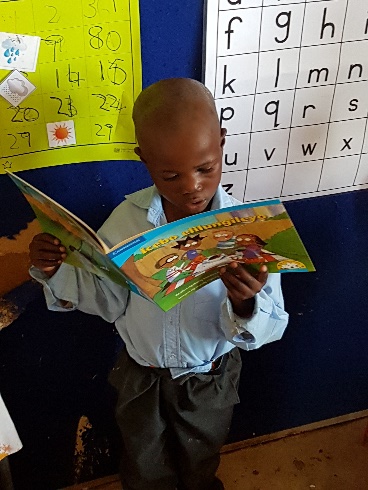
Between 2013 and 2017, UNICEF South Africa contributed about R14 million (USD 1.2 million) to the NMIRD. Evidence shows that there has been an improvement in both numeracy and literacy levels of Grade R learners since the inception of the programme over a decade ago.
Its success has led to the University of Fort Hare setting up a bilingual education programme to train teachers to teach in indigenous languages.
Fifty kilometres from the town of Bizana is Dlangezwa Senior Primary School. Established in 1985, the school has 178 learners from Grade R to Grade 7 and the NMIRD has worked with this school since 2009 with a focus on Grades R to 3 learners.
Principal Zamuxolo Mdatya credited it with helping him and his teaching staff realise that the foundation phase of teaching is critical to a child’s development.
Six-year old Thobela Bhoyoyo is an inspiring example of a learner who has benefitted from the programme. This Grade R learner is a confident reader who, according to his teachers, understands the reading text at a level above that of most Grade six learners.
The Bilingual Interactive Differentiated Classrooms programme made books the focus of his learning and showcased his reading ability. Neatly-dressed in his school uniform, this shy little boy said that he loves seeing the words in his home language of isiXhosa. He added that he wants to be a teacher when he grows up and recounted proudly how his friends like him to read to them.
Meanwhile with South Africa celebrating the Centenary of former President Nelson Mandela the country can recall that Madiba had a soft spot for language.
He was once quoted saying “If you talk to a man in a language he understands, that goes to his head. If you talk to him in his language, which goes to his heart.”
South Africa will come alive with activities in celebration of Nelson Mandela’s centenary tomorrow by spreading some Madiba Magic by helping charities, disadvantaged schools and advocating for peace and reconciliation.
Various other government departments and institutions have planned activities for the day - which is also known as National Day of Service - to go out in their numbers to follow in Tata’s footsteps to make a difference by donating time towards humanitarian efforts and disadvantaged communities to inspire a positive change that promotes the culture of ubuntu.
NHI a leap forward in healthcare
NHI a leap forward in healthcare lebangThe National Development Plan states that poor quality of healthcare needs to be addressed.
 Health Minister Dr Aaron Motsoaledi says the National Health Insurance (NHI) Amendment Bill will improve the quality of healthcare in South Africa.
Health Minister Dr Aaron Motsoaledi says the National Health Insurance (NHI) Amendment Bill will improve the quality of healthcare in South Africa.
Minister Motsoaledi recently unveiled the NHI Amendment Bill and the Medical Schemes Amendment Bill.
The Bills will pave the way for more access to medical healthcare through the NHI.
Most Bills are drawn up by a government department under the direction of the relevant minister. The bill must be approved by the Cabinet before being submitted to Parliament.
The introduction of these two Bills means that South Africa is one step closer to achieving universal healthcare which means the NHI will soon be law.
The NHI is a financing system that will make sure that all citizens of South Africa are provided with essential healthcare, regardless of their employment status and ability to make a direct financial contribution to the fund.
Motsoaledi said government is painfully aware of the fact that some people believe that before speaking about the NHI, the ailing public healthcare system should benefit first.
Motsoaledi said the National Development Plan has flagged it unambiguously and that in implementing NHI, the poor quality of healthcare and existing cost of private healthcare need to be addressed.
While the amendments to the Bills are being debated, the department will implement at least four NHI projects including school health, mental health, pregnant women with complicated pregnancies in 22 highly-affected hospitals and oncology, with specific focus on Gauteng and KwaZulu-Natal, while not ignoring other provinces.
Motsoaledi also said the cost of private healthcare is out of reach for many citizens, with former Chief Justice Sandile Ngcobo appointed by the Competition Commission to conduct a market inquiry into the cost of private healthcare.
“The amendments we are introducing are meant to provide much needed relief to patients finding themselves in serious financial hardships,” he said.
Motsoaledi said the first amendment to the Medical Schemes Amendment Bill will be to abolish co-payments.
That is when the scheme pays a portion of the bill that a provider – be it hospital or private doctor – charges a patient. The rest of the funds are supposed to be paid by the patient from their own pocket.
Did You Know?
The Department of Health has completed or is in the process of completing the construction and refurbishment of 701 clinics and spent over 40 billion in preparation for the NHI.
New library a bag of knowledge for rural communities
New library a bag of knowledge for rural communities UrsulaSport, Arts and Culture
The opening of a library in the North West forms part of government’s ongoing efforts to create a reading nation and give people better access to information.
Thousands of learners from rural schools around Tshing and neighbouring communities in the North West are now enjoying access to books and the internet following the opening of a local library.
The newly constructed Tshing Community Library was officially opened near Ventersdorp by Arts and Culture Minister Nathi Mthethwa and the North West MEC for Culture, Arts and Traditional Affairs Ontlametse Mochware recently.
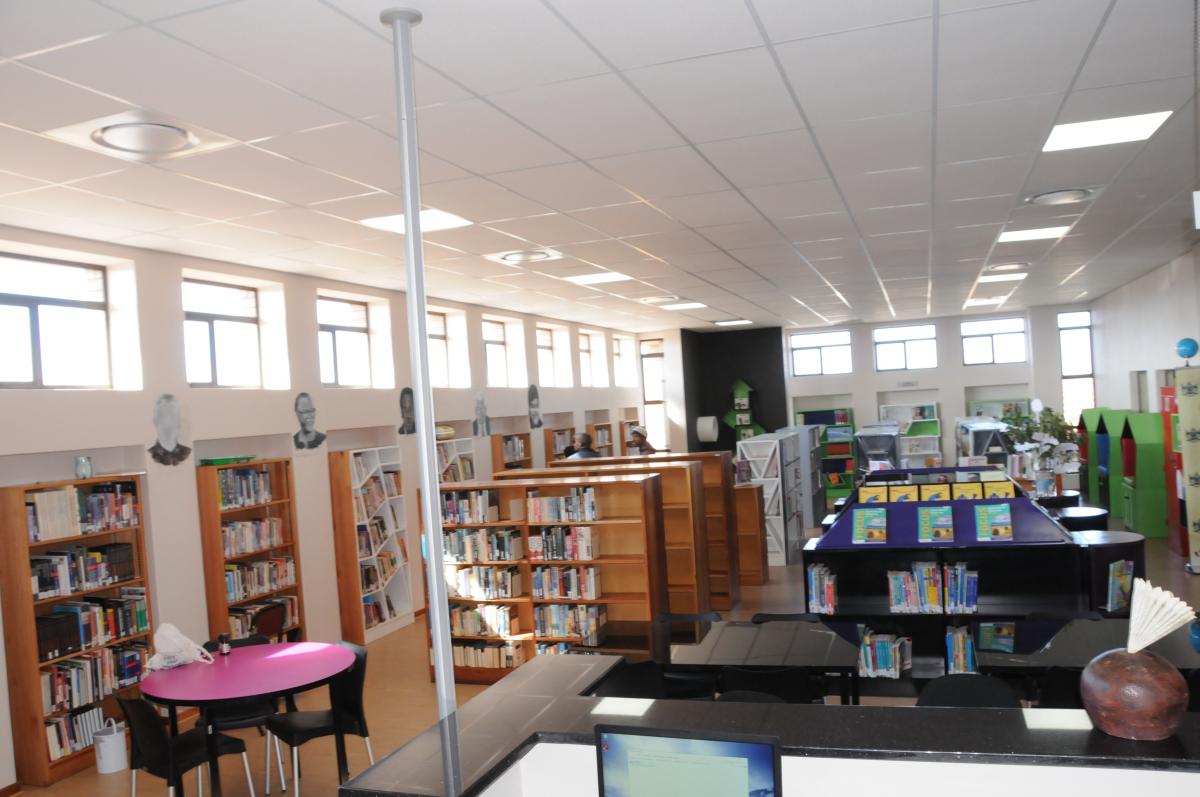 The library is fully equipped with all the necessary resources and books to allow easy access to information.
The library is fully equipped with all the necessary resources and books to allow easy access to information.
It has designated areas for all levels of development from foundation to tertiary education, including material for reading for fun in order to create and enhance a culture of reading.
Over and above making information accessible to school learners, the library creates an opportunity for community members to access computers and the internet. It is hoped this will assist job seekers, especially unemployed graduates and youth, with career development and access to information.
Community member Lesley Rratshekola of GaMogopa in Ventersdorp is excited about the library.
He said Tshing is a rural community and is mostly surrounded by farms. Many of the area’s youth are unemployed and will benefit greatly from the library’s services.
“Not all of us in the area have jobs. Most of the young people in our communities cannot even afford cellular data to access the internet. Therefore, the library will come in handy in providing internet access for free to those who need it as they will use it to search for job opportunities and do research for various reasons,” said Rratshekola.
One hundred police cadets to join 100 Men March
One hundred police cadets to join 100 Men March JoyMinister of Police Bheki Cele and 100 police cadets will lend their voices to the fight against gender-based violence when they join the highly-anticipated 100 Men March in Pretoria on 11 July.
Minister Cele had pledged to prioritise and intensify the fight against crimes against women, children and vulnerable groups when tabling the SAPS budget vote in parliament in May 2018.
In a statement, the South African Police Services (SAPS) said the Minister would address the march, pledging his support to stop violence against women and children.
“The march draws 100 men from different categories across our society to create a visible front of men marching together to show their commitment to making South Africa safer for women and children.
“The scourge of violence against women and children is a huge threat to our development as a nation. On average, one in five South African women older than 18 has experienced physical violence,” said the SAPS.
The march was launched by Government Communications, and will draw at least 100 men from various sectors of society, such as business, labour, faith-based organisations, non-profit and media organisations.
It not only serves as a call for an end to violence against women and children, but will also commemorate the centenary celebrations of former President Nelson Mandela and struggle stalwart Albertina Sisulu. Both worked tirelessly for human rights during their lives.
The SAPS called on all organisations to join the march and demonstrate their resolve to ending violence against women and children.
The march will begin at Church Square at 10AM and end at the southern lawns of The Union Buildings.
Members of the public can join in the conversation on Twitter using the hashtag #ThumaMina #100MenMarch.
One million t-shirts for Madiba
One million t-shirts for Madiba vuyelwanMandela Centenary
A leading Cape Town textile and apparel firm has put its machinists at the forefront of a campaign to produce one million t-shirts to celebrate the Centenary Celebration of former President Nelson Mandela.
Some of the ladies who are employed with Trade Call Investments (TCI) Apparel (PTY) Ltd wrote their stories on the t-shirts that will be sold locally and globally in line with the Nelson Mandela Centenary Celebration.
TCI Apparel has partnered with the Nelson Mandela Foundation to design, manufacture and sell t-shirts bearing Nelson Mandela’s image to raise awareness around the centenary celebrations. A portion of the proceeds will be donated to the foundation.
Chief Commercial Officer Thilu Govender said the company was proud to be associated with the project.
“I think it has been amazing for us. When we look at the legacy of the great Madiba, we feel really proud that we are the pioneers of such an initiative jointly with the Foundation. It gives us a sense of pride that we have brought this campaign to all nations that knew and loved him.”
Govender said TCI decided to honour Madiba’s legacy by asking the seamstresses to write their own messages.
In their own words, the seamstresses crafted their own brief stories on the t-shirts.
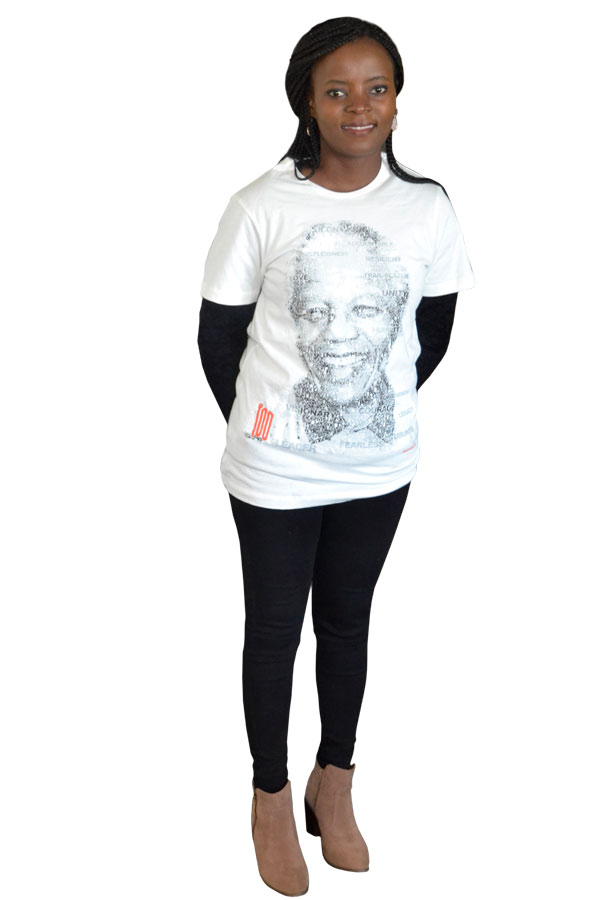 “My name is Nomvula Masondo. I am a seamstress working in a clothing factory in Ladysmith, South Africa
“My name is Nomvula Masondo. I am a seamstress working in a clothing factory in Ladysmith, South Africa
“I made your special t-shirt with lots of care”.
I have worked in the clothing industry for 35 years. My work has contributed tremendously to the quality of my life. With the money I earn, I am able to support my family and my eldest child who is doing second year at college.”
“My name is Chevonne Swarts. I am 28 years old. I am a seamstress working in a clothing factory in Cape Town, South Africa.
I am the mother of a 10 year old boy.
“I made your special t-shirt with lots of care”.
My dream is to educate and provide for my child. By buying this t-shirt you are contributing not only to my dream but to those of my fellow workers.”
Govender said the t-shirts were produced to have the DNA of Africa - with the fabric being sourced within the continent and the entire manufacturing value chain being localised.
Quality healthcare for all
Quality healthcare for all Joy
The right to health care services is enshrined in the South African Constitution and includes the provision of access to services including reproductive health and emergency services, basic health services for children and medical support for a wide range of others including prisoners.
For our country to succeed it needs to ensure that its citizens are healthy and have access to quality health care and for more than 20 years we have watched the country’s healthcare service become more accessible to all South Africans.
The positive strides that have been made in the country’s health sector are as a result of Madiba’s efforts.
He was the pioneer of some of the health care policies that are bearing fruits in our country. At the core of these policies is the right to access health care.
When Mandela took office at the top of his list of priorities was creating universal access to primary health care. It was during his term that free health-care for pregnant mothers and young children was introduced. Section 28 includes a clear reference to the provision of basic health services for children funded by the State.
This was the first time any form of free health care had been provided to South Africans. In 2006 free primary healthcare services were provided to all users of public facilities.
I believe because of his passion for healthcare and the decisions he took soon after the advent of democracy South Africa’s infant mortality rate dropped by 32 percent between 2002 and 2017.
The rate of antenatal first visits increased by 96 percent between 2006 and 2016, from 31.3 percent to 61.2 percent.
 The country’s maternal mortality deaths have also decreased mainly because pregnant women have access to free health service. For its part, the current government continues to encourage pregnant women to attend antenatal visits at their nearest clinic.
The country’s maternal mortality deaths have also decreased mainly because pregnant women have access to free health service. For its part, the current government continues to encourage pregnant women to attend antenatal visits at their nearest clinic.
The focus on health also decreased maternal mortality death in public health hospitals by 29 per cent between 2009 and 2016, where institutional maternal death ratios decreased from 189 per 100 000 births to 134 per 100 000.
Children also held a special place in Mandela’s heart and he clearly loved being with young South Africans and other children across the globe, as they loved being with him.
Another fact sometimes overlooked was Madiba was often at the forefront of the child vaccination programme to help save children from preventable diseases.
He once said: “Giving children a healthy start in life, no matter where they are born or the circumstances of their birth, is the moral obligation of every one of us.”
He believed that preventing child disease was not only an act to save a life but to also help strengthen communities and contribute to the development of strong and prosperous nations.
Through this position as the Chairman of the Board of The Vaccine Fund which is the financial arm of the Global Alliance, he championed vaccination not only in South Africa but across the world.
In 2009 South Africa walked in Madiba’s footsteps and introduced two new vaccines in the routine immunisation programme, namely the Pneumococcal conjugate vaccine and the rotavirus vaccine.
Pneumococcal diseases include very dangerous diseases like meningitis and severe pneumonia. These are the global leading causes of death of children up to five years old.
In South Africa, pneumococcal disease takes second place to HIV and AIDS in the death rate of those under five. Since the launch of these vaccines there has been a 70 percent decline in invasive pneumococcal disease in children in this age range.
Access to universal health care is also one of our goals in the National Development Plan. By the year 2030 we envisage that there will be a significant shift in the efficiency, effectiveness and quality of health care provision.
While providing quality health care is a priority for this government, we also need you to do your part in ensuring that you are a healthy South African.
This means following a nutritious diet and exercising as these two aspects can make a positive contribution to your life and reduce the burden of disease on our country.
Madiba himself believed that exercise is the key not only to physical health but to peace of mind.
Let us continue to build on the foundation laid by Madiba and at the same time take better care of ourselves.
Textile designer taking African craft to the world
Textile designer taking African craft to the world lebangAn entrepreneur wants to establish a lasting legacy that adds sustainable value to the local creative industry
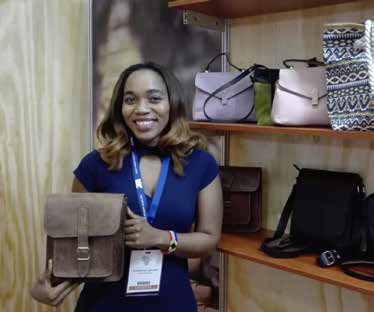 Textile designer and businesswoman Nthabi Lephoko has set her sights on taking South Africa’s leather goods industry to the world.
Textile designer and businesswoman Nthabi Lephoko has set her sights on taking South Africa’s leather goods industry to the world.
Lephoko is the head designer and director of Leratolethato, her own leather design and manufacturing company based in Cape Town.
She started her business in 2011 while conducting a feasibility study on animal skin and hides with the Department of Trade and Industry (dti).
“I was inspired by the opportunities in this sector, and have never looked back. I was able to establish my company which currently employs six people, and I am definitely looking forward to expanding operations,” she said.
Her company produces a variety of fashion products such as card holders, wallets, leather belts, handbags and clothing.
“I also do a furniture range for which I manufacture cushions, chairs and couches,” said Lephoko.
Her depth of knowledge in management and marketing has enabled her to grow her business in local markets.
“The local reception for my range of products has been interesting. I have had the opportunity to supply small niche boutiques. I have always been targeting a niche market and I have a passion for it. I have an understanding that there is a great buying power within that market,” she said.
Lephoko believed in creating an attractive product that appealed to a wider market.
“In terms of managing cash flow it is important to always have an entry product which can be targeted at the mainstream market. The only way that one can master that is when one expands so that we are able to manufacture more and trigger a positive cash flow.”
Lephoko wants to establish a lasting legacy that adds sustainable value to the local creative industry. She already has plans to grow her business and achieve this ideal.
“I am looking at establishing an incubator which will focus on leather manufacturing and I can share my skills with other people. Some of the reasons I would like to expand and eventually establish an incubator is to get the kind of support I need and the kind of quality control that would enable me to meet standards internationally,” she said.
The Clothing and Textiles Competitiveness Programme approved R4,9 billion to create and save jobs in the sector last year through the Production Incentives Programme (PIP) within the Clothing and Textiles. In addition, more than R3.1 billion was disbursed until the financial year 2016/2017.
The life and times of Mandela
The life and times of Mandela vuyelwanTourism Transformation Fund to bridge inequality gap
Tourism Transformation Fund to bridge inequality gap vuyelwanA Department of Tourism funding initiative will boost transformation in the sector.
Black investors and communities who are interested in investing in capital projects in the tourism sector are invited to submit applications for funding.
That is the message from those involved in the newly launched Tourism Transformation Fund (TTF). It is a dedicated capital investment funding mechanism established by the Department of Tourism in collaboration with the National Empowerment Fund (NEF).
Prospective applicants have until 31 August to submit their applications and can receive up to R5 million each if successful. 
The department is contributing R120 million to the fund over the next three years which will be used as grant funding. It said this will help to unlock investment in the tourism sector by qualifying black-owned small and micro tourism enterprises.
The department said the grant will be used to reduce the funding gap that may exist between the prospective investor’s own contribution and the approved loan finance or equity contribution by the NEF for tourism projects.
“The funding mechanism seeks to drive transformation in the tourism sector in a more direct and impactful manner that will not only assist black-owned tourism enterprises to expand and grow but also catalyse the rise of a new generation of black, youth, women and community owned tourism enterprises,” the department said.
There is a checklist that must be adhered to and attached when applying, which includes:
- A signed application form
- Land ownership structure (lease or owned)
- Copy of bank statements for the past six months (for an existing business).
The checklist also requires applicants to provide information regarding financials of the business, town planning approvals and environmental authorisations, lodge/property feasibility, property management and marketing strategy and the professional team. Applicants should also describe the nature of the business and describe the shareholding structure.
Physical applications may be delivered to West Block, 187 Rivonia Road, Morningside, 2057, Johannesburg.
Electronic submissions and enquiries may be emailed to tourism@nefcorp.co.za
More detailed information on the TTF as well as an application form and checklist can be downloaded from the NEF website: http://www.nefcorp.co.za
Prospective applicants who have enquiries may also call 011 305 8000 or 086 184 3633.
The department said incomplete applications will not be considered for funding.
When life gives you a lemon, farm it
When life gives you a lemon, farm it lebangThe Farmer Support and Development Programme assists disadvantaged communities and individuals, especially land reform beneficiaries.
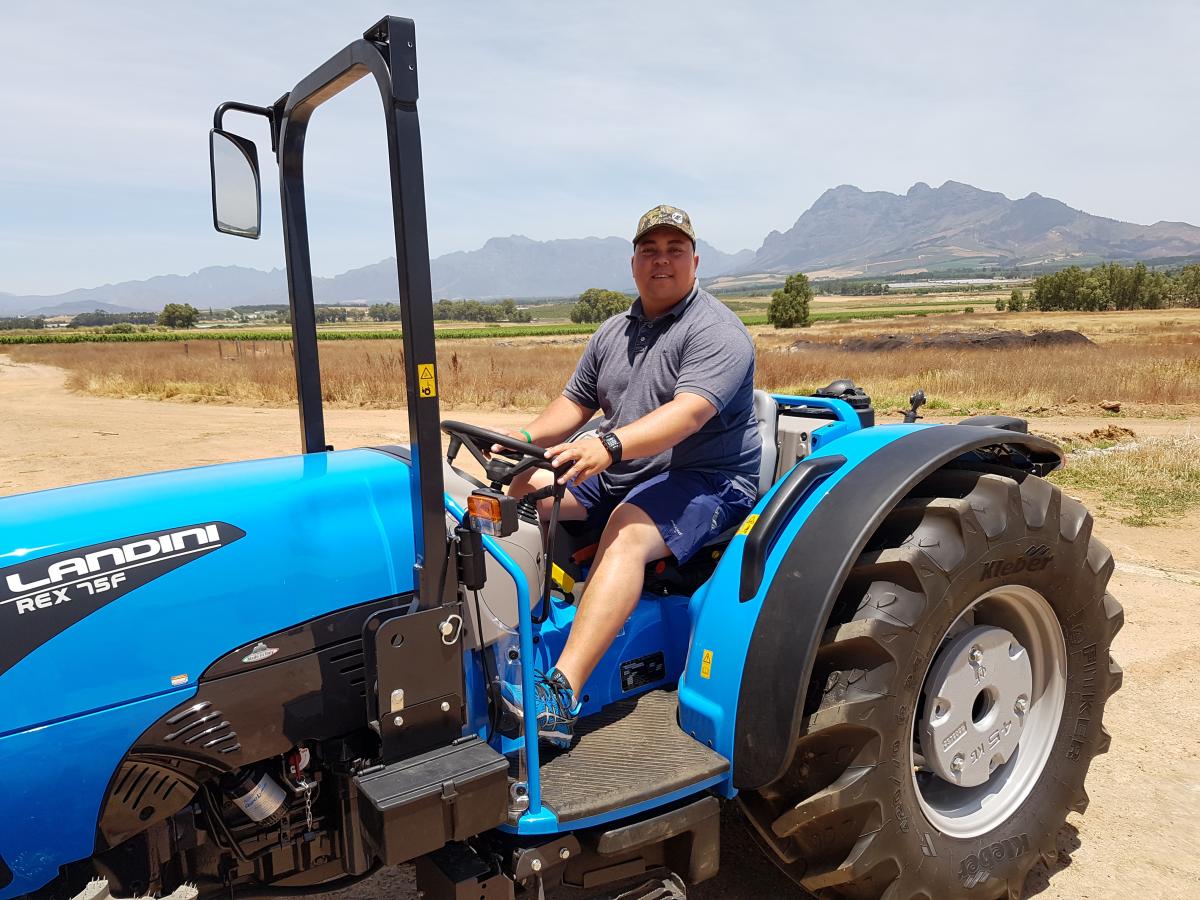 The Western Cape Department of Agriculture runs a programme that helps new and established farmers with a support mechanism from day one – when they need help with funding– until they become self-sustainable.
The Western Cape Department of Agriculture runs a programme that helps new and established farmers with a support mechanism from day one – when they need help with funding– until they become self-sustainable.
The Farmer Support and Development Programme has helped young people like Wayne Mansfield (33) from Paarl, who has gone from working as a hawker for his uncle at the Cape Town Market, during his school days, to exporting his own lemons that he farms on a leased piece of land.
Ten years ago, when he was a 23-year-old entrepreneur, Mansfield turned down an opportunity to work at a farm he was sourcing lemons to resell. At the time he had little interest in farming.
However, a couple of years down the line, he changed his mind when he noticed an increased market demand for lemons.
“I also noticed that farmers were doing what we hawkers were doing – they were packing their own stock and selling it at the Cape Town Market. I realised that soon there would not be a good market for hawkers,” he said.
Around 2013, a local farmer agreed to mentor Mansfield and leased him 12 hectares of land. He also installed an irrigation system that enabled Mansfield to plough.
In 2015, he was able to export about 31 tonnes of lemons and, this figure rose substantially to 168 tonnes in 2016.
Thanks to the mentorship and help received from the Farmer Support and Development Programme which saw him receive a Comprehensive Agricultural Support Programme (CASP) grant in 2015, he was able to put down strong roots and flourish as a farmer.
Building capacity for farmers
The Farmer Support and Development Programme aims to build the capacity of historically disadvantaged communities and individuals, in particular land reform beneficiaries. It caters for emerging, subsistence, smallholder and commercial farmers.
Project administrator for agricultural development support services at the Western Cape Department of Agriculture Shaheed Martin said the programme has helped farmers become self-sustainable.
“We assist farmers right from the start. This means we help them with the application process to access grant funding and once they are approved, we help them with implementation and production,” he said.
He explained that the department takes a holistic approach and provides the full complement of agricultural support services, including infrastructure support.
“We have economists and they give the farmers access to markets once they are established,” he said.
If you are a smallholder and commercial farmer you can contact 021 808 5111 for more information on the Farmer Support and Development Programme.
Young female farmer leads in YAFF awards
Young female farmer leads in YAFF awards lebangBeing born with a disability did not stop Landiswa Diniso from achieving her dream of being a farmer. In fact, it encouraged her to work harder.
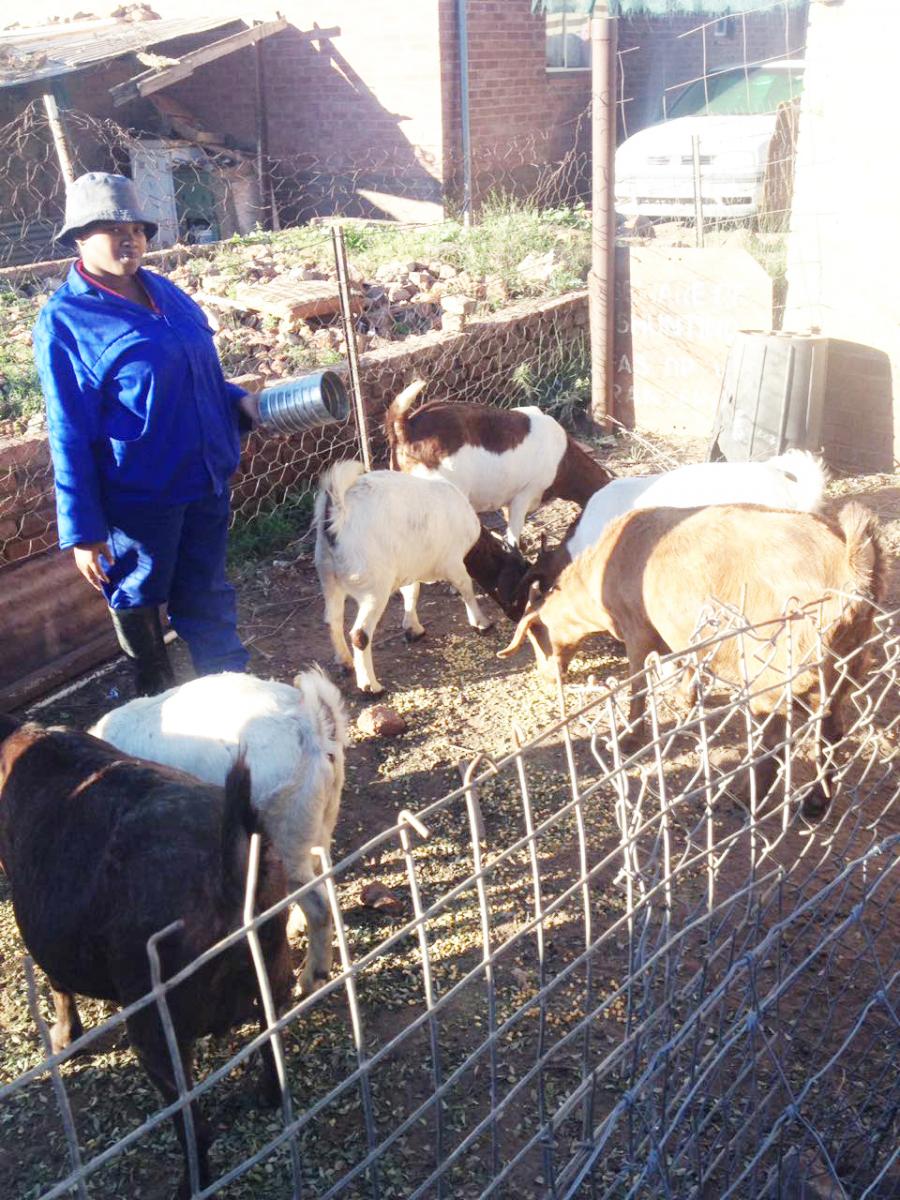 The 28-year-old is the owner of Landiswa Diniso Livestock Enterprise in Burgersdorp in the northern part of the Eastern Cape.
The 28-year-old is the owner of Landiswa Diniso Livestock Enterprise in Burgersdorp in the northern part of the Eastern Cape.
She walked away with the Special Ministerial Award for a young entrepreneur living with a disability at the recently held 2018 Youth in Agriculture, Forestry and Fisheries (YAFF) awards.
Diniso was born with a disability in her left leg and has to wear a brace for support. However, she has not allowed her disability to limit her.
As a young woman who grew up on a farm and later moved to a township in the Eastern Cape, Diniso said her journey into farming started over three years ago when her uncle gave her a calf.
She kept her calf in a grazing area and in 2015 the same animal which was now a cow had a calf. This inspired the farmer to continue in the farming business and she approached the Department of Rural Development and Agrarian Reform for support. She received animal feed and goats to start her business.
Today, the enterprise has grown to include a herd of 10 cattle, seven goats, eight pigs and a small patch where Diniso plants vegetables for the household and sells the surplus to the local community. This has become a means of livelihood for Diniso and her family.
She wishes to become a successful livestock farmer in the future and become an inspiration to the younger generation.
With the prize money of R50 000 she said it would help her start her goals. “The prize money will really assist my business. I believe farming is important because it creates job opportunities for unemployed youth,” said Diniso.
Speaking at the awards ceremony, the Minister for Agriculture, Forestry and Fisheries, Senzeni Zokwana, said the nominees and recipients of the YAFF awards were proof that the youth is interested in the agriculture sector.
Young jeweller designs a brighter future
Young jeweller designs a brighter future vuyelwanTshepang Mawatsa dreams of a bright, beautiful future as a top jewellery designer.
The 26-year-old is a student at the Virginia Jewellery School (VJS) in the Free State, where she is learning to be an artisan in the design, craft and polishing of jewellery.
Mawatsa grew up in Virginia. Her mother passed away during her matric year and tragedy struck her family again when her father, who was a mine worker, contracted tuberculosis and was unable to work. 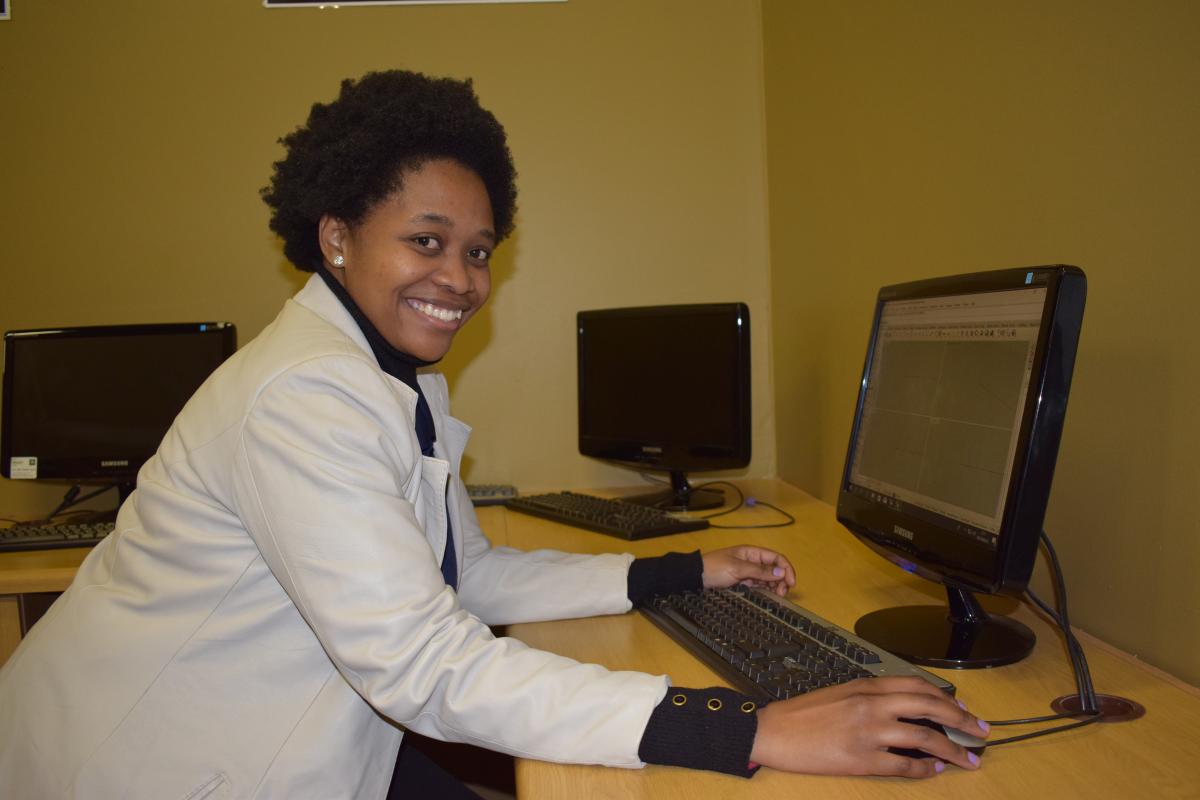
The youngster’s dream of studying further was dashed because of their dire financial situation and she spent the next two years idling at home.
Then one day her father told her that he had heard on the community radio station about a programme that was looking for unemployed youth to be trained in jewellery making. “I did not hesitate to apply,” said Mawatsa.
VJS grew from a Harmony Gold Mining Company corporate social investment initiative launched in 2000 and aligned with government’s local beneficiation objectives which Mawatsa has benefitted from
“I’ve always loved jewellery but I never thought that one day I’d actually be the one making it. When I came here I didn’t know anything, all I knew was that jewellery is beautiful. That’s it,” she said.
“Now I’ve fallen in love with the industry.”
Mawatsa said the programme has taught her patience, consistency and the importance of team work.
“Initially I couldn’t work with other people, but now I understand the importance of working together for a common goal.”
Mawatsa said designing a piece of jewellery and then bringing it to life is an amazing feeling.
Mawatsa’s faith and her family have kept her grounded and positive. Impressed with the work being done by Mawatsa and her fellow students, the provincial Department of Economic, Small Business Development, Tourism and Environmental Affairs in partnership with Nedbank recently donated 20 computers to the school.
According to Mawatsa, there are about 12 students at the school and previously, they all had to share one computer to design and complete their projects.
“These computers will be very helpful to us,” said Mawatsa, explaining that some of the students had no computer experience when starting at VJS.
The computers will allow the students to enhance their skills in Computer-aided Design, which results in jewellery that is designed to very precise standards.
The determined and excited Mawatsa said her background inspires her to work hard and make something of her life. “Where I come from doesn’t necessarily determine where I’m going, but it helps me to determine my path. I might have started in a shamble, but I know this is the path to a better future.”